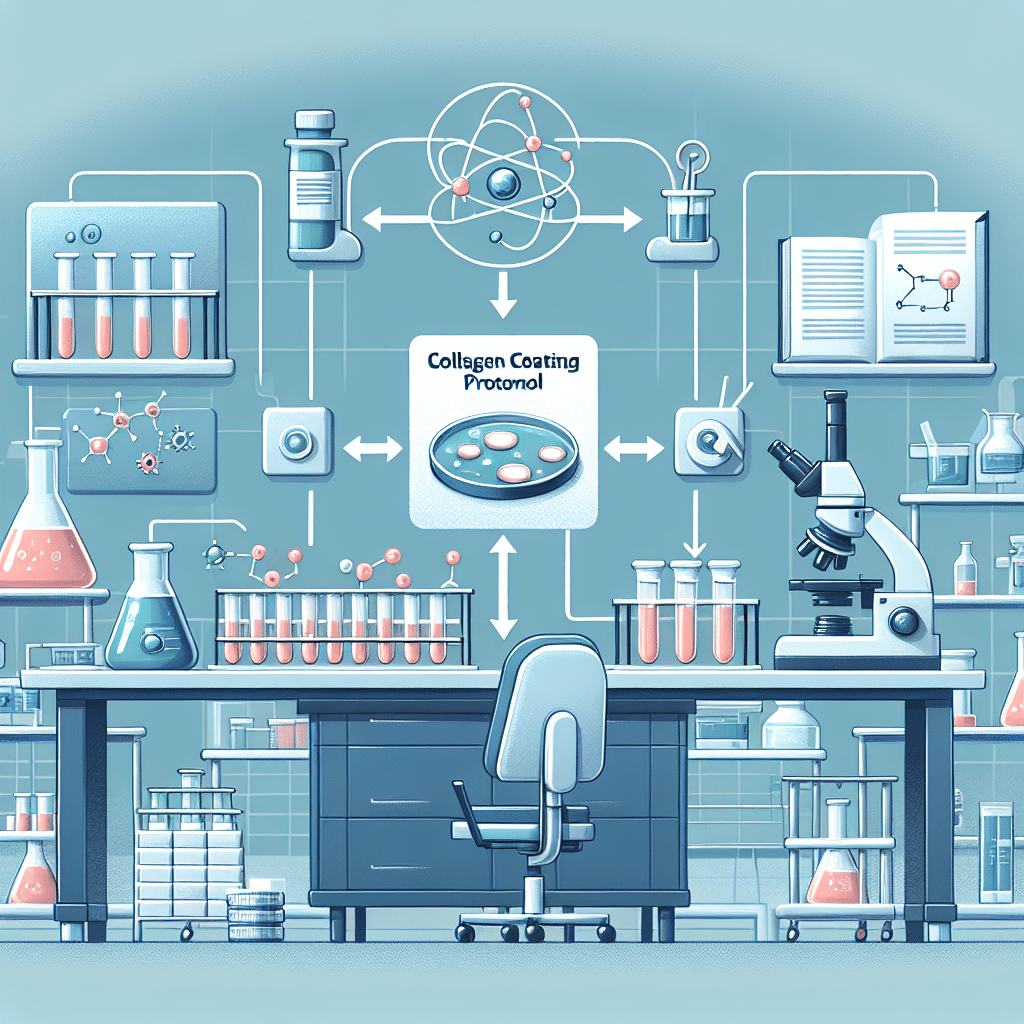Collagen Coating Protocol: For Scientific Research
-
Table of Contents
Collagen Coating Protocol: Enhancing Scientific Research Outcomes

Collagen, the most abundant protein in the animal kingdom, is a critical component of connective tissues. It plays a vital role in maintaining the structural integrity of skin, bone, cartilage, and blood vessels. In scientific research, collagen is often used as a coating material for cell culture studies to promote cell attachment, growth, and differentiation. This article delves into the collagen coating protocol, its significance, and its applications in scientific research.
Understanding Collagen Coating
Collagen coating involves the application of a thin layer of collagen onto tissue culture plasticware to enhance cell attachment and proliferation. This process is crucial for studies involving cell behavior, drug testing, and tissue engineering. The coating mimics the extracellular matrix (ECM), providing a more natural environment for cells in vitro.
Preparation of Collagen Solutions
Before delving into the coating protocol, it is essential to prepare the collagen solution correctly. The following steps outline the preparation process:
- Choose the appropriate type of collagen (e.g., type I, II, or III) based on the cell type and research objectives.
- Dissolve lyophilized collagen in an acidic solution, such as 0.1% acetic acid, to create a collagen stock solution.
- Adjust the pH of the solution to a physiological level (7.4) using a buffer, such as phosphate-buffered saline (PBS).
- Sterilize the solution by filtration through a 0.2 µm filter to remove any contaminants.
Collagen Coating Protocol
The collagen coating protocol involves several critical steps to ensure optimal cell growth conditions:
- Surface Preparation: Clean the culture surface to remove any debris or contaminants that could interfere with the coating process.
- Application of Collagen: Apply the prepared collagen solution to the culture surface, ensuring even distribution.
- Incubation: Allow the collagen to adsorb onto the surface by incubating at room temperature or 37°C for a specified period, usually 1-2 hours.
- Aspiration: Remove any excess collagen solution and rinse the surface with PBS to eliminate unbound collagen.
- Drying: Air-dry the coated surface in a laminar flow hood to promote cross-linking and stabilization of the collagen layer.
Once the coating is complete, the surface is ready for cell seeding. It is crucial to maintain sterility throughout the process to prevent contamination.
Applications in Research
Collagen-coated surfaces have a wide range of applications in scientific research, including:
- Cell Culture: Enhancing the growth and differentiation of various cell types, including stem cells, epithelial cells, and muscle cells.
- Tissue Engineering: Serving as a scaffold for tissue regeneration studies, such as skin, bone, and cartilage repair.
- Drug Testing: Providing a more physiologically relevant environment for testing pharmaceutical compounds.
- Wound Healing Studies: Mimicking the ECM to study cellular mechanisms involved in wound repair.
Case Studies and Statistics
Several case studies have demonstrated the effectiveness of collagen coating in research. For instance, a study on stem cell differentiation showed that collagen-coated surfaces significantly enhanced the formation of neuronal networks compared to uncoated surfaces. Additionally, statistics from tissue engineering research indicate that collagen scaffolds improve cell survival and integration in vivo, leading to better outcomes in regenerative medicine.
Conclusion
The collagen coating protocol is a cornerstone technique in cell culture and tissue engineering research. By providing cells with a surface that closely resembles their natural environment, researchers can obtain more accurate and relevant data. The careful preparation of collagen solutions and adherence to the coating protocol are essential for successful outcomes. As scientific inquiry advances, the use of collagen coatings will continue to be pivotal in unlocking the mysteries of cellular behavior and the development of novel therapeutic strategies.
ETChem: Your Trusted Source for Premium Collagen Products
For researchers and scientists seeking high-quality collagen for their studies, ETChem offers a range of superior protein products. Their extensive selection includes marine, fish, bovine, chicken, and various types of collagen, catering to diverse research needs. With a commitment to excellence, ETChem’s products are characterized by neutral taste and instant solubility, making them ideal for scientific applications.
About ETChem:
ETChem, a reputable Chinese Collagen factory manufacturer and supplier, is renowned for producing, stocking, exporting, and delivering the highest quality collagens. They include marine collagen, fish collagen, bovine collagen, chicken collagen, type I collagen, type II collagen and type III collagen etc. Their offerings, characterized by a neutral taste, instant solubility attributes, cater to a diverse range of industries. They serve nutraceutical, pharmaceutical, cosmeceutical, veterinary, as well as food and beverage finished product distributors, traders, and manufacturers across Europe, USA, Canada, Australia, Thailand, Japan, Korea, Brazil, and Chile, among others.
ETChem specialization includes exporting and delivering tailor-made collagen powder and finished collagen nutritional supplements. Their extensive product range covers sectors like Food and Beverage, Sports Nutrition, Weight Management, Dietary Supplements, Health and Wellness Products, ensuring comprehensive solutions to meet all your protein needs.
As a trusted company by leading global food and beverage brands and Fortune 500 companies, ETChem reinforces China’s reputation in the global arena. For more information or to sample their products, please contact them and email karen(at)et-chem.com today.

